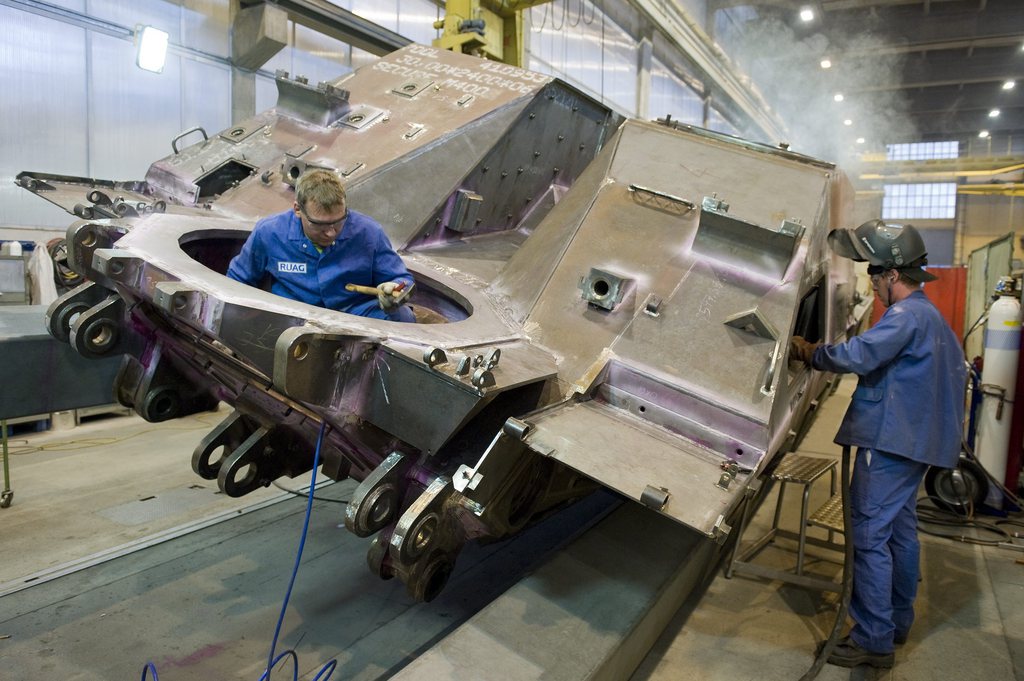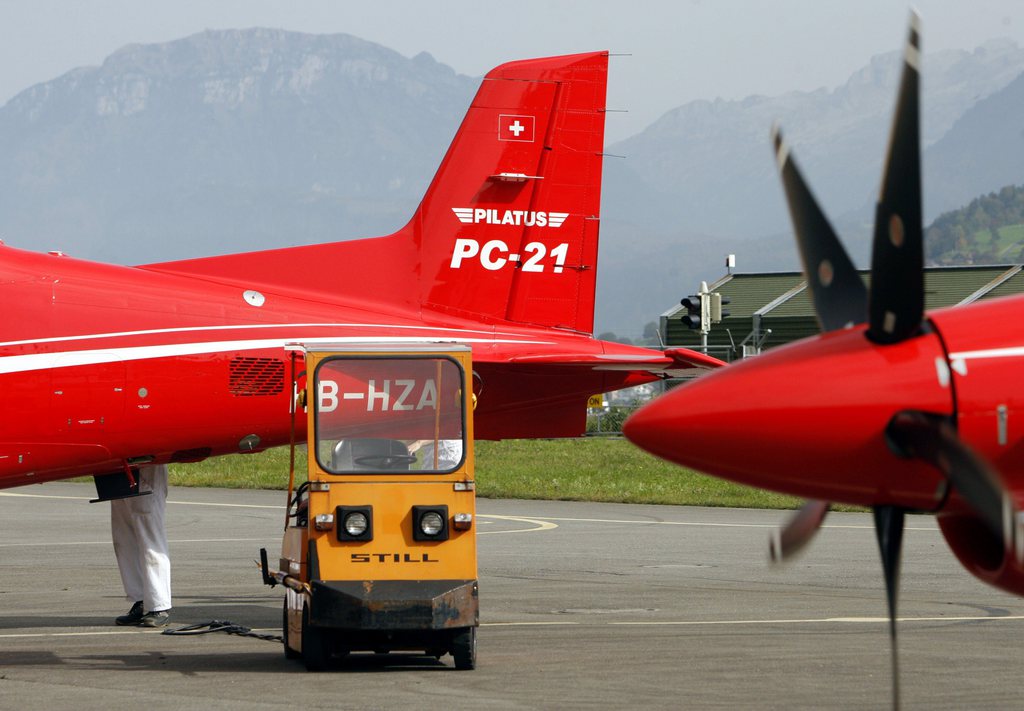Are Gripen trade promises just an illusion?

Offset, as it’s known in the trade, is a term that has frequently been heard in the Swiss debate on buying 22 Swedish Gripen fighter jets. But, ahead of a nationwide vote, past experience of industrial back-scratching isn’t exactly encouraging.
“I’ll buy 22 of your planes for CHF2.2 billion ($2.5 billion) and you, Saab, promise to sign contracts of an equal amount with Swiss companies.” That is a simplistic summary of the agreement the Swiss government wants to sign with the Swedish constructor – as long as Swiss voters play their part on May 18 and approve the deal.
This practice – also known as industrial compensation – is common in the aerospace and military industries (see infobox).
Each country has its own ways of doing business, but virtually all of them include this sort of clause when purchasing war materiel from another country. Switzerland, for example, demands offset obligations equal to 100% of the value of the contract.
Offsets or industrial participations are all types of compensation transactions in connection with defence procurements abroad.
Direct offsets are primarily transactions which are directly connected to the respective defence procurement. Direct offsets are realised if they create capacities and/or know-how contributing to maximum autonomous maintenance, quality maintenance and upgrade of a system and to the growth of the armed forces and of the core capabilities of the industry relevant to security and armament.
Indirect offsets are not related to the respective defence procurement. This type of industrial participation primarily applies to industrial contracts, offset-relevant financing activities, technology transfers, joint developments or marketing and sales support etc. Indirect offsets can be divided into: indirect offsets relevant to security and armament policy; civilian industrial indirect offsets.
(Source: defence ministry)
The issue regularly reappears whenever there’s a significant purchase. During the campaign to buy F/A-18 jets in 1993, in order to get voters to approve the necessary credit of CHF3.5 billion the then defence minister, Kaspar Villiger, said again and again that every centime would be compensated for by United States orders in Switzerland.
The same argument is being made today by Gripen supporters and the current defence minister, Ueli Maurer.
Damning report
Smoke and mirrors, say opponents, pointing to a 2007 report by the Federal Audit Office (see link).
The government watchdog examined 28 cases of arms acquisition which had taken place between 1995 and 2005 and established that the volume of offsets was far from the declared 100% – it was in fact more like 40%. The figure for the F/A-18s was similar.
“The audit office does not consider compensatory business an option which offers good prospects for Swiss industry,” it concluded.
“Its effectiveness on investment turns out to be greatly inferior to what had been announced in the weapons programmes […] and its effects are in general less durable concerning the creation of value in Switzerland.”
Armasuisse, the federal competence centre for procurement of complex systems and equipment, emphatically rejected these conclusions, accusing the report of being “unbalanced, incomplete and in parts wrong”.
But afterwards the government stepped in, creating in January 2010 a new office, the so-called Offset Office, under the auspices of Armasuisse. One of its tasks is to check the soundness of this type of business.
The 22 Gripen fighters will cost Swiss taxpayers CHF3.1 billion. Foreign suppliers have pledged to compensate Swiss industry equal to 100% of the value of the contract.
The total volume of compensation, not including Swiss suppliers or government bodies, comes to CHF2.5 billion, of which CHF2.2 billion falls to Saab.
To date, the Swedish company has signed compensatory deals with Swiss companies worth CHF400 million, according to Saab. Armasuisse has recognised offset deals worth around CHF250 million.
‘Clear commitments’
“The past doesn’t interest me that much. Today one works on very diverse bases – I’m not worried in the least,” said parliamentarian Hugues Hiltpold from the centre-right Radical Party and co-president of the “Yes to Gripen” committee.
“Very clear commitments have been made, with precise allocation for industry participants: 65% for German-speaking Switzerland, 30% for French-speaking Switzerland and 5% for Italian-speaking Switzerland,” said Hiltpold, also a member of the House of Representatives’ security committee.
“If voters approve the purchase, the Swedish constructor will definitely be taken to task if the offsets do not reach the fixed volume.”
On April 11, a survey by the leading GfS Bern research and polling institute predicted a close result. “At this stage both a yes or a no majority are equally probable,” said political scientist Claude Longchamp, even though at this point in the campaign opponents have a 10% lead.
‘No guarantees’
Christian van Singer from the Green Party, and also a member of the House of Representatives’ security committee, completely disagrees with Hiltpold.
“There’s absolutely no guarantee that this deal will be made – and even if it is, in the size declared,” he said.
“For example, before the Swiss parliament approved the purchase, Saab said it would buy 50 aircraft from [Swiss manufacturer] Pilatus. That number has now dwindled to 20 – and the Swedish parliament still needs to approve it.”
But even if the offset isn’t 100%, surely any compensatory business is good for Swiss industry? Christian van Singer has his doubts.
“The CHF3.1 billion cost of the Gripen will end up being CHF10 billion if you take into account the costs of training, maintenance and development.” (See infobox)
“If you want to spend that much, you’d be better off investing it in the necessary improvement of infrastructure. That would be much better for the Swiss economy.”
Transparency
Another much-discussed issue concerns the transparency of the offsets.
The former head of the Offset Office, Albert Gaide, has heavily criticised this, declaring in various newspapers and in front of the House of Representatives’ security committee that he was put under pressure by Saab and Armasuisse to accept contracts as offsets – although in fact they weren’t.
Gaide, 75, was dismissed at the end of 2013 and now fears that Armasuisse is trying to weaken the office in order to have a free hand. The office has today been reduced to a bare minimum.
Giovanni Giunta, Gaide’s successor – whom swissinfo.ch tried to contact, without success – works only two days a month, according to various sources.
For its part, Armasuisse says it has no desire to subjugate the Offset Office and insists that the separation with Gaide was by mutual agreement.
It told the Tages-Anzeiger newspaper that the monitoring of affairs follows precise rules and that, regarding Giunta’s work hours, it was looking for a specialist to work 20-30%.
This isn’t good enough for Pierre-Alain Fridez from the centre-left Social Democrats who at the end of last year raised a parliamentary question on compensatory business.
“[Armasuisse] has lost all credibility. They just want a yes man who won’t offer any resistance or criticism.”
(Adapted from Italian by Thomas Stephens)

In compliance with the JTI standards
More: SWI swissinfo.ch certified by the Journalism Trust Initiative



You can find an overview of ongoing debates with our journalists here. Please join us!
If you want to start a conversation about a topic raised in this article or want to report factual errors, email us at english@swissinfo.ch.